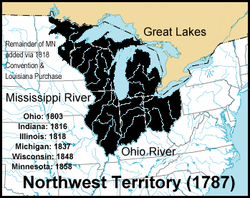United States Northwest Territory
| Territory Northwest of the River Ohio | |||||
| Organized incorporated territory of United States | |||||
|
|||||
|
Motto Meliorem lapsa locavit "He has planted one better than the one fallen" |
|||||
| Capital |
Marietta (1788–1799) Chillicothe (1799–1803) |
||||
| Government | Organized incorporated territory | ||||
| Governor | |||||
| • | 1787–1802 | Arthur St. Clair | |||
| • | 1802–1803 | Charles Willing Byrd | |||
| History | |||||
| • | Northwest Ordinance | July 13, 1787 | |||
| • | Affirmed by United States Congress | August 7, 1789 | |||
| • | Indiana Territory created | May 7, 1800 | |||
| • | Statehood of Ohio | March 1, 1803 | |||
The post-American Revolutionary War Territory Northwest of the River Ohio, more commonly known as the Northwest Territory encompassing most of the pre-war territory of the Ohio Country, parts of Illinois Country, and parts of old French Canada below the Great Lakes was an organized incorporated territory of the United States spanning most or large parts of six eventual U.S. States. It existed legally from July 13, 1787, until March 1, 1803, when the southeastern portion of the territory was admitted to the Union as the state of Ohio, and the remainder was reorganized by additional legislative actions.
In the 18th century, Great Britain and the France disputed for control of this region. The French had claimed it in the 17th century as part of New France; the competition between these empires was one cause of the French and Indian War (known as the Seven Years' War in Europe). After Britain gained control following its defeat of France in 1763, its attempts to reserve territory for use by Native Americans, under the Royal Proclamation of 1763, and for a new colony the British Province of Quebec, roused resentment among British colonists, who were already seeking to settle west of the Appalachian Mountains.
...
Wikipedia


